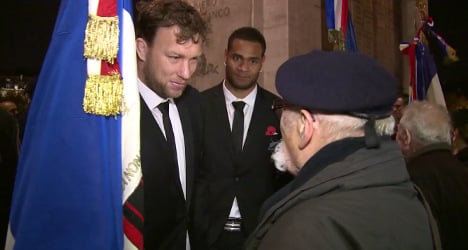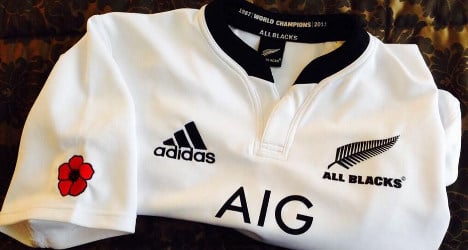New Zealand will wear a specially designed white jersey with a red poppy on the sleeve when they tackle France in Paris on Saturday, two days before Armistice Day commemorations.
The All Blacks unveiled a picture of the shirt on their Twitter feed Friday and captain Richie McCaw later told journalists that it was important to remember those who fought during the First World War.
The gesture, which was accompanied by a "lest we forget" hashtag, comes just two days after All Blacks players visited the Tomb of the Unknown Soldier beneath the Arc de Triomphe in the French capital.

All Blacks squad members pay tribute to French war veterans at the Tomb of the Unknown Soldier under the Arc de Triomphe in Paris. Photo: All Blacks/Youtube
"We just took the time to make sure everyone understood the reason for wearing the poppy," he said.
"It's obvious you'll never (forget about it) in these parts of the world but a lot of Kiwis had a few bits to do with things during World War One and we wanted to make sure everyone knew why we were wearing one on our jersey."
'An unprecedented assembly and a great demonstration for peace'
The gesture by the New Zealand rugby team came just a day after French president François Hollande announced an unprecedented assembly of world leaders in France, to commemorate the 100th anniversary of the beginning of World War I, next year.
France will issue an unprecedented invitation to all 72 countries involved in World War I to take part in its annual Bastille Day military parade in July next year, Hollande announced on Thursday.
Bastille Day, on July 14, will fall just before the 100th anniversary of the start of the 1914-18 Great War.
Hollande also revealed that Germany's President, Joachim Gauck, will come to France for a ceremony on August 3, 2014, which will be exactly a century after the two countries declared war on each other.
"I asked the president of the Federal Republic (Germany) Mr Gauck to come to France on the occasion of the commemoration of this tragic act, he has accepted and I thank him for that," Hollande said in a speech launching the centenary.
"On July 14, all 72 countries that we can call belligerents of the Great War will be invited to take part in the parade on the Champs-Elysees.
"They will be gathered together for an unprecedented national festival – unprecedented because it will be international.
"There will be soldiers in their uniforms with their flags but young civilians will also take part in what will be a great demonstration for peace."



 Please whitelist us to continue reading.
Please whitelist us to continue reading.
Member comments